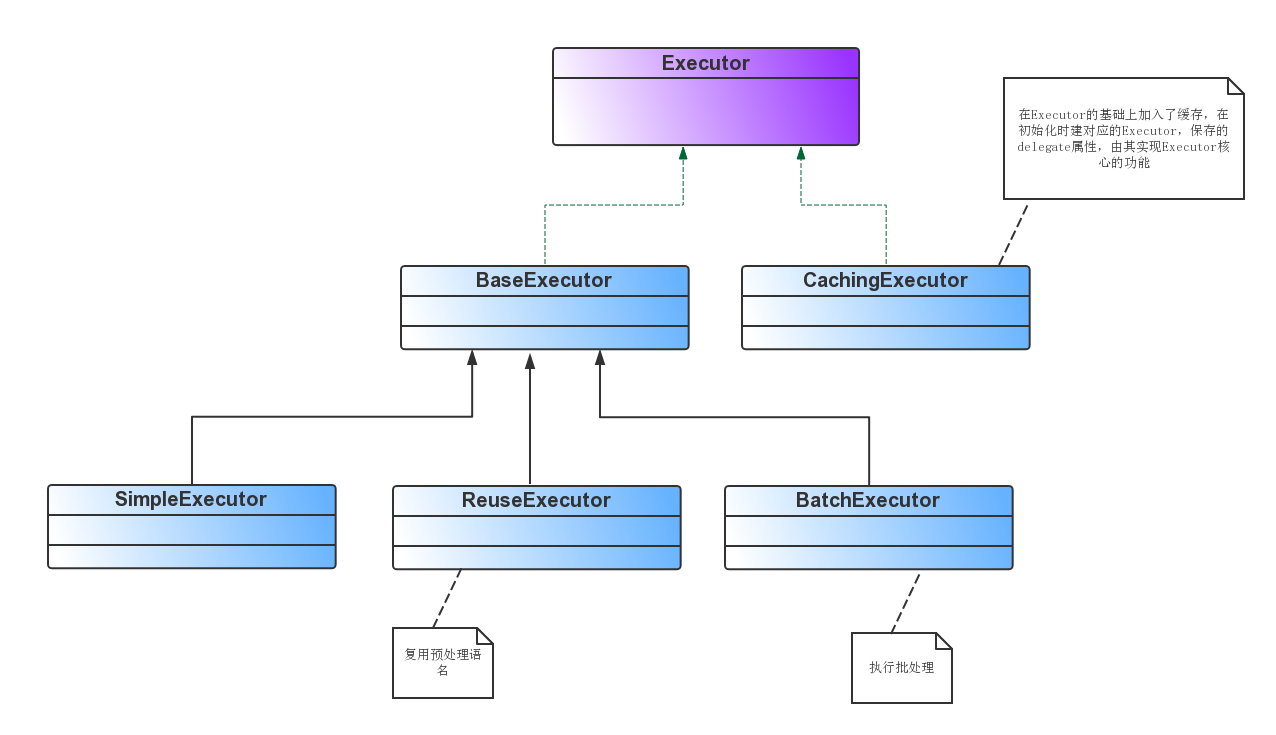前提:一级缓存与二级缓存,可见:https://www.cnblogs.com/yanze/p/10175017.html
简介:
Executor与SqlSession绑定在一起,每一个SqlSession都拥有一个新的Executor对象,Executor可以认为是SqlSession的核心。
Executor类图如下:

Executor
顶层接口,定义基本操作

public interface Executor { ResultHandler NO_RESULT_HANDLER = null; // 更新 int update(MappedStatement ms, Object parameter) throws SQLException; // 查询,先查缓存,再查数据库 <E> List<E> query(MappedStatement ms, Object parameter, RowBounds rowBounds, ResultHandler resultHandler, CacheKey cacheKey, BoundSql boundSql) throws SQLException; // 查询 <E> List<E> query(MappedStatement ms, Object parameter, RowBounds rowBounds, ResultHandler resultHandler) throws SQLException; <E> Cursor<E> queryCursor(MappedStatement ms, Object parameter, RowBounds rowBounds) throws SQLException; List<BatchResult> flushStatements() throws SQLException; // 事务提交 void commit(boolean required) throws SQLException; // 事务回滚 void rollback(boolean required) throws SQLException; // 创建缓存的键对象 CacheKey createCacheKey(MappedStatement ms, Object parameterObject, RowBounds rowBounds, BoundSql boundSql); // 缓存中是否有这个查询的结果 boolean isCached(MappedStatement ms, CacheKey key); // 清空缓存 void clearLocalCache(); void deferLoad(MappedStatement ms, MetaObject resultObject, String property, CacheKey key, Class<?> targetType); Transaction getTransaction(); void close(boolean forceRollback); boolean isClosed(); void setExecutorWrapper(Executor executor); }
BaseExecutor
抽像类,实现了Executor接口,实现了执行器的基本功能,在创建时会根据传过来的ExecutorType创建不同的类,
我们可以在配置文件中定义默认类型
<settings> <!--SIMPLE、REUSE、BATCH--> <setting name="defaultExecutorType" value="SIMPLE"/> </settings>
备注:
继承BaseExecutor的Executor默认都支持一级缓存
SimpleExecutor
每执行一次update或select,就开启一个Statement/PrepareStatement对象,用完立刻关闭Statement/PrepareStatement对象。
ReuseExecutor(复用)
每执行一次update或select,以sql作为key查找Statement对象,存在就使用,不存在就创建,用完后,不关闭Statement对象,而是放置于Map<String, Statement>内,供下一次使用。(可以是Statement或PrepareStatement对象)
BatchExecutor(批处理)
执行update时(没有select,JDBC批处理不支持select),将所有sql都添加到批处理中(addBatch()),等待统一执行(executeBatch()),
它缓存了多个Statement对象,每个Statement对象都是addBatch()完毕后,等待逐一执行executeBatch()批处理的;
BatchExecutor相当于维护了多个桶,每个桶里都装了很多属于自己的SQL,就像苹果蓝里装了很多苹果,番茄蓝里装了很多番茄,最后,再统一倒进仓库。(可以是Statement或PrepareStatement对象)
简单来说:攒一波再处理
-------------------------------------------------
CatchingExecutor
查询时先从二级缓存中获取查询结果,存在就返回,不存在,再委托给Executor delegate(委托)去数据库取,delegate可以是上面任一的SimpleExecutor、ReuseExecutor、BatchExecutor。
